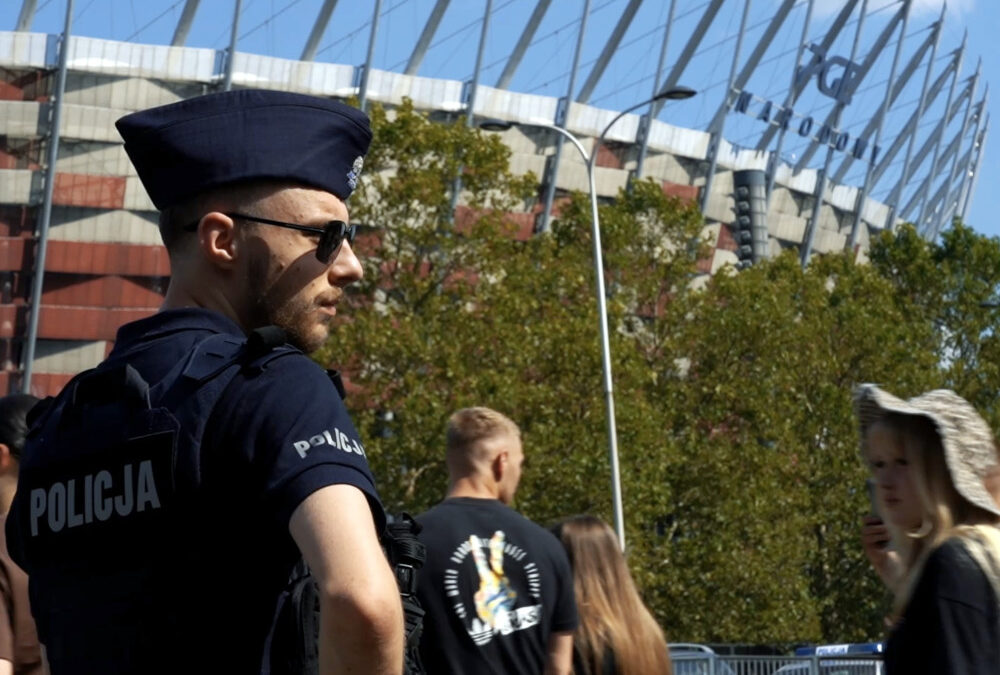Keep our news free from ads and paywalls by making a donation to support our work!

Notes from Poland is run by a small editorial team and is published by an independent, non-profit foundation that is funded through donations from our readers. We cannot do what we do without your support.
A concert by Belarusian rapper Max Korzh at Warsaw’s National Stadium ended in controversy after police detained over 100 fans for alleged criminal acts.
The interior minister also announced that an investigation has been opened into the displaying of “totalitarian symbols” after images of a Ukrainian nationalist flag associated with the massacre of ethnic Poles during World War Two stirred anger in Poland.
🇵🇱🇺🇦🇧🇾
W sobotę na Stadionie Narodowym w Warszawie odbył się koncert białoruskiego rapera Maxa Korzha. Podczas występu jego fani z Ukrainy rozwiesili banderowską, czerwono-czarną flagę UPA. Przed rozpoczęciem wydarzenia doszło również do przepychanek z ochroną.Źródło: Pch24 pic.twitter.com/mMYSzkCrkF
— WarNewsPL (@WarNewsPL1) August 11, 2025
Rapper Max Korzh, who performs mainly in Russian, is popular among the many Belarusian and Ukrainian immigrants and refugees who live in Poland.
That popularity has been bolstered by Korzh’s support for protests against Belarusian dictator Alexander Lukashenko and his opposition to Russia’s invasion of Ukraine. The 60,000 tickets for his concert at the National Stadium sold out within five days.
The event took place on 9 August, the fifth anniversary of the presidential election in Belarus that prompted mass protests against Lukashenko, who was declared the winner amid widespread evidence of vote-rigging. Many audience members displayed Ukrainian flags and red-and-white Belarusian opposition flags.
As the concert got underway, videos began appearing on social media showing some fans storming from the seating area of the venue into the standing area around the stage while security guards tried largely in vain to stop them.
Podczas koncertu białoruskiego rapera Maxa Korzha na Stadionie Narodowym w Warszawie doszło do niebezpiecznych incydentów. Chwilę przed występem część publiczności zaczęła przeskakiwać przez barierki i zbiegać z trybun na płytę stadionu. Próby powstrzymania tłumu przez ochronę… pic.twitter.com/jbOeorqZuc
— 🌐 ᴛʜᴇᴘᴏʟᴀɴᴅɴᴇᴡs 🌐 (@thepolandnews_) August 10, 2025
Later, further outrage was sparked by images that showed a member of the crowd holding up the red-and-black flag of the Ukrainian Insurgent Army (UPA).
Formed during the Second World War, the UPA was a Ukrainian nationalist partisan group that fought for independence. Figures associated with it are often celebrated as national heroes in Ukraine.
However, the UPA was also responsible for the wartime Volhynia massacres, in which up to 100,000 ethnic Polish civilians, as well as members of other minorities, were killed. Poland regards the episode as a genocide.
“Hundreds of able-bodied, conscription-age Ukrainians, last night at a concert in Warsaw,” wrote Poland’s former ambassador to the United States, Marek Magierowski. “Proudly displaying a red-and-black nationalist flag, an outrageous insult to most Poles…I am truly enraged.”
Hundreds of able-bodied, conscription-age Ukrainians, last night at a concert in Warsaw. Proudly displaying a red-and-black nationalist flag, an outrageous insult to most Poles. As 🇵🇱 ambassador to 🇺🇸 I was staunchly defending the Ukrainian cause in D.C. Now I am truly enraged. pic.twitter.com/kYhN0kzWnU
— Marek Magierowski (@mmagierowski) August 10, 2025
On Monday, Warsaw police revealed that they had detained 109 people for violating the law during the concert. Most of them, reports broadcaster RMF, will be charged with criminal offences, including possession of drugs, unlawfully entering the venue, and assaults against security staff.
Meanwhile, the operators of the National Stadium released a statement announcing that it had filed a report to prosecutors of a possible crime relating to the “displaying of flags with clearly negative historical associations”.
“We firmly and unequivocally condemn the display of content that promotes any totalitarian system and incites hatred,” they wrote. “The rules in force at our facility prohibit the display of symbols, slogans or signs associated with totalitarian regimes or those that spread hatred based on nationality, ethnicity or culture.”
The police also announced that they had been “investigating those responsible for the display of slogans at the stadium that may constitute a prohibited act” and had “already sent the evidence collected to the prosecutor’s office”.
On Monday, Poland’s interior minister, Marcin Kierwiński, condemned criminal acts that had taken place at the concert and praised the police for “acting decisively”. He also revealed that “three flags bearing totalitarian symbols” are being analysed.
If those guilty of crimes are from outside Poland, then “we will implement procedures to return them to the country from which they came”, said Kierwiński, quoted by the Rzeczpospolita daily.
In Poland, it is a crime, punishable by up to three years in prison, to “promote fascist or other totalitarian system or incite hatred based on national, ethnic, racial or religious differences”.
While that law specifically bars the promotion of Nazism and communism, last year, Poland’s right-wing opposition submitted a bill that would also add propagation of “Banderism”, meaning glorification of historical Ukrainian nationalist leader Stepan Bandera, to the law.
Poland's opposition has submitted a proposed law banning glorification of Ukrainian nationalist leader Stepan Bandera.
It would place propagation of Banderism alongside Nazism, fascism and communism as a crime carrying a jail sentence of up to three years https://t.co/TZxBLIa4Mx
— Notes from Poland 🇵🇱 (@notesfrompoland) December 4, 2024

Notes from Poland is run by a small editorial team and published by an independent, non-profit foundation that is funded through donations from our readers. We cannot do what we do without your support.
Main image credit: Policja Warszawa (under CC BY-NC-ND 3.0 PL)

Daniel Tilles is editor-in-chief of Notes from Poland. He has written on Polish affairs for a wide range of publications, including Foreign Policy, POLITICO Europe, EUobserver and Dziennik Gazeta Prawna.


















